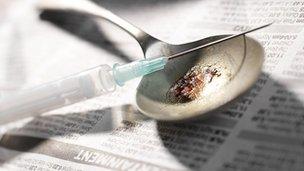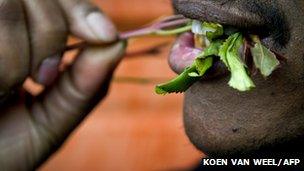Drug addicts to be given foil to encourage treatment
- Published

The intention is to get drug addicts into treatment
Drug users are to be offered free foil, used as a surface to heat up drugs like heroin, to encourage them to get help for their addiction.
New laws will allow drug treatment providers to offer the foil as part of efforts to get addicts into treatment, and to protect their health.
The Advisory Council on the Misuse of Drugs (ACMD) made the recommendation.
Home Secretary Theresa May said mechanisms will be put in place to monitor the provision of foil.
Aluminium foil is used as a cooking surface when heating up certain drugs so they can be injected, while heroin, marijuana, cocaine and crystal meth can be smoked from it.
Health risks
The ACMD, which advises the government, said the available evidence shows that providing drug paraphernalia such as foil at treatment centres "does increase the number of individuals who engage with the services".
"In turn, engagement with treatment services increases the likelihood of an individual's recovery," it said.
Mrs May announced in a written ministerial statement, external that she had accepted the ACMD's advice, "subject to the strict condition that it is part of structured efforts to get people into treatment and off drugs".
Mrs May said providing foil would also tackle the "significant health risks" associated with injecting drugs, such as the transmission of dangerous blood borne viruses.
The idea is that addicts can use the foil to inhale heroin, rather than injecting it.
Martin Barnes, the chief executive of charity DrugScope, has welcomed the news.
He said the move does not mean foil "must or will be provided" but can be offered as part of an overall package of advice, support and treatment.
"Support that enables heroin and other drug users to reduce the risks to themselves and others can be the catalyst for engaging with treatment and support for recovery," he said.
'Moral worth'
The Independent Scientific Committee on Drugs - chaired by the former head of the ACMD Professor David Nutt, who was sacked by the last Labour government for criticising government drugs policy - also welcomed the Home Office's decision to accept the recommendations.
But a spokeswoman said it was "troubling and illogical" that there would be "more stringent restrictions" for the provision of foil than for providing needles.
"Whilst it is clear from the ACMD's 2010 report that providing foil also provides an opportunity to engage injecting drug users in harm reduction and potentially drug cessation discussions, one of the primary benefits is in encouraging a move away from injecting and therefore reducing the risk of blood borne infections and overdose which affect not only the user but their families as well as wider society in the form of NHS and social costs.

Khat, a herbal stimulant, is to be banned by the government, against ACMD advice
"The question here is does the Home Office want to reduce drug harms or simply to send a message about the moral and social worth of drug users?"
Record low
The number of heroin and crack cocaine users in England fell below 300,000 for the first time, according to figures by the National Treatment Agency for Substance Misuse .
The figure peaked at 332,090 in 2005-06 before dropping to 298,752 in 2010-11.
The latest estimates reveal there was a sharp drop in the number of under 35s using the most harmful drugs.
On Wednesday the home secretary announced the government would ban the herbal stimulant called khat, against the advice of the ACMD.
The drugs advisory council said there was "insufficient evidence" that khat caused health problems.
But Mrs May said it would be banned as a Class C drug because the risks posed by the substance could have been underestimated.
The Commons home affairs committee has called for a root-and-branch review of drugs strategy, suggesting a Royal Commission should examine policy and consult the public on alternative ideas.
But Mrs May said there was "no case" for such a move and hailed "promising" progress in various areas since 2010. She insisted early intervention and "recovery incentivisation" schemes were working.
- Published3 July 2013
- Published10 December 2012
- Published24 April 2012
- Published3 July 2012